
Mobile App Development: The Ultimate Game Changer!
-
By Amardeep Singh Sandhu
-
2nd August 2023
Smartphones are now an integral part of our lives with mobile apps influencing how we shop, communicate, and work. These apps offer instant access to information at our fingertips. The Evolution of App Development Frameworks has brought a revolution. App frameworks are powerful tools that ease building mobile apps. They provide developers with an efficient environment to create user-friendly, feature-rich applications.
Understanding Frameworks in Programming
What Are Frameworks and Their Role in Software Development?
Frameworks in programming are pre-made structures that serve as a base for creating software programs. They act as a framework, providing a set of rules and instructions that programmers can use to create effective and useful software. Similar to a blueprint, a framework speeds up development and eliminates the need for tedious coding activities. Frameworks also assure adherence to coding standards and best practices, producing code that is cleaner and easier to maintain. They improve communication amongst developers working on the same project because everyone adheres to the same standards and procedures.
Advantages of Using Frameworks in Mobile App Development
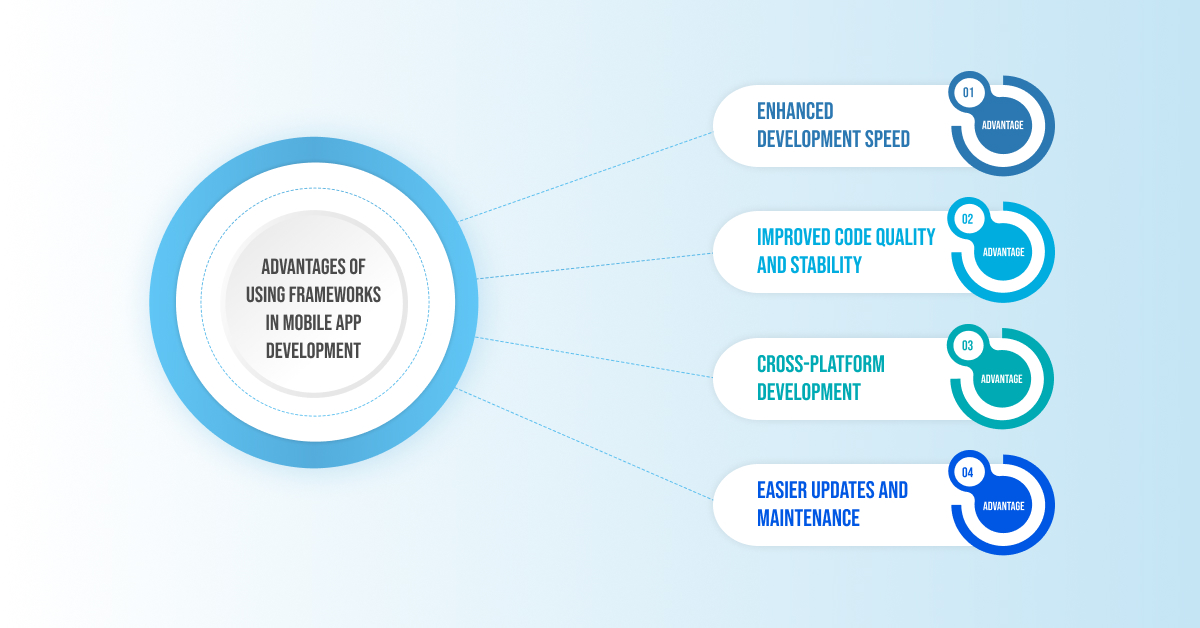
The use of frameworks in mobile application development offers many benefits that increase efficiency and productivity. One important benefit is development speed. With the pre-built component’s functionality provided by frameworks, developers can create feature-rich applications in less time. Additionally, meeting tight deadlines and staying ahead of the competition.
Frameworks also improve code quality and stability. Because these frameworks are thoroughly tested and used by a large community of developers, they are less prone to bugs and errors. This results in robust and reliable applications that provide a seamless user experience.
Frameworks also promote cross-platform development, allowing developers to write code once and use it on both Android and iOS. This saves time and resources by eliminating the need to maintain separate code bases for each platform.
Using frameworks also makes maintenance and updates easier. When updates or changes are required, developers can update the framework, which is reflected throughout the application. This ensures consistency and reduces the risk of introducing new bugs during updates.
Exploring Web Development Frameworks
Overview of Web Development Frameworks
Web development frameworks are tools and libraries that simplify web application construction. These frameworks provide a structured and organized approach to web development, guiding developers through creating web pages and web services.
Web frameworks offer various features, such as templating engines, database access, and security measures. They support the Model-View-Controller (MVC) architecture, separating the application’s data, logic, and user interface, making it easier to maintain and update.
Some prominent web frameworks include Laravel, Django, React, Angular, Vue.js, and Ruby on Rails. Each framework has strengths and specialties, catering to different project requirements and developer preferences.
How Web Development Frameworks Benefit Mobile App Development
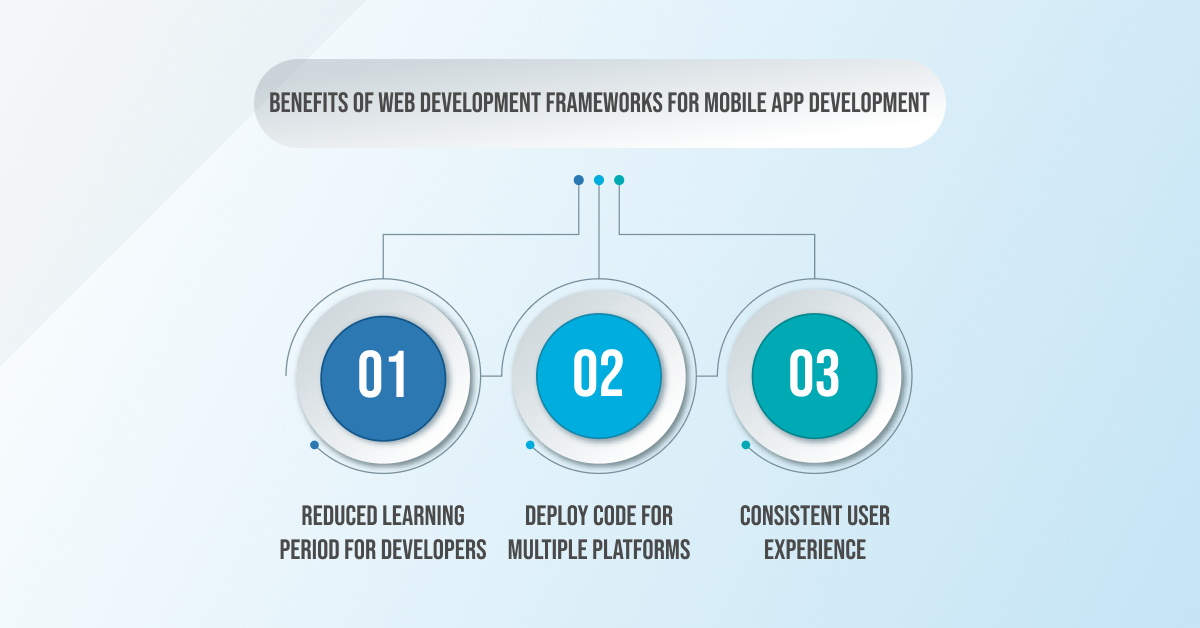
Web development frameworks play a significant role in app development, especially cross-platform development. With the rise of hybrid and progressive web apps, web frameworks have become crucial for creating mobile apps that work seamlessly on Android and iOS devices.
Using web development frameworks for app development offers several benefits. Firstly, developers can leverage their web development skills and knowledge to build mobile apps. This decreases the learning period and speeds up the app development process.
Secondly, web frameworks enable developers to write code once and deploy it across multiple platforms. This eliminates creating separate codebases for each platform, resulting in cost savings and easier maintenance.
Moreover, web frameworks provide a consistent user experience across different devices and screen sizes. They automatically adjust the app’s layout and design to fit various screen resolutions, ensuring a responsive and user-friendly interface.
Angular Programming for Mobile Apps
Introduction to Angular Framework
Angular is a web development framework upheld by Google. It is widely used for building dynamic and responsive web applications. In recent years, Angular has also gained traction in app development thanks to its versatility and performance.
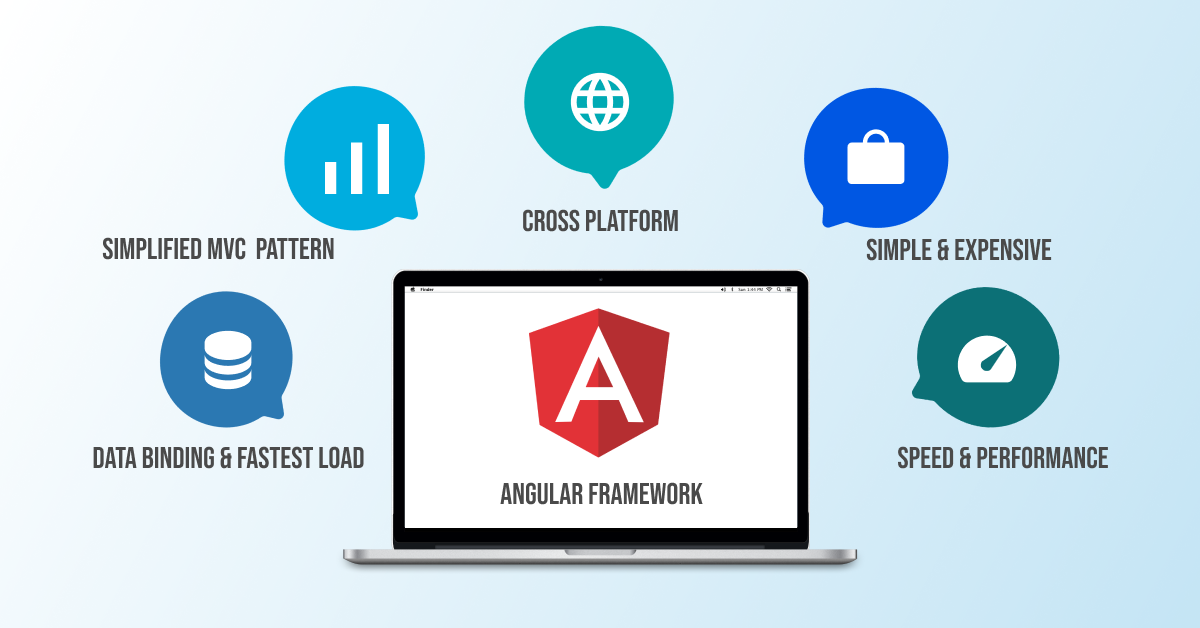
Angular is an open-source framework that follows the Model-View-Controller (MVC) architecture. It allows developers to build client-side applications using HTML, CSS, and JavaScript, with additional support for TypeScript. The framework offers robust tools and features to streamline the development process and enhance the overall user experience.
Key Features and Benefits in Mobile App Development
Regarding app development, Angular programming offers several key features and benefits that make it a preferred choice for developers. One of the significant advantages is code reusability. Additionally, with Angular, developers can reuse a considerable portion of the codebase between web and mobile applications, saving time and effort.
Angular also provides a comprehensive set of pre-built UI components and libraries, ensuring consistency and ease of development. The framework’s powerful data binding capabilities enable real-time updates, creating responsive and interactive mobile apps.
Moreover, Angular offers excellent performance optimization through Ahead-of-Time (AOT) compilation. This compilation technique minimizes the size of the application bundle and improves load times, resulting in faster and more efficient mobile apps.
Real-world Examples of Angular in Mobile Apps
Many real-world mobile apps have been built using Angular, showcasing the framework’s capabilities and potential. Popular apps such as Ionic, Sworkit, and HealthCare.gov have used Angular to deliver seamless, feature-rich user experiences.
Ionic, for instance, is a hybrid mobile app development framework that utilizes Angular for building native-like apps across various platforms. Sworkit, a fitness app, relies on Angular for its interactive user interface and real-time workout tracking. HealthCare.gov uses Angular to deliver vital health insurance information to millions of users.
Django Programming for Mobile Apps
Introduction to Django Framework
Django is a high-level web development framework that simplifies the web application process. It is based on Python and follows the Model-View-Template (MVT) architecture, offering developers a structured and efficient way to create robust web applications.
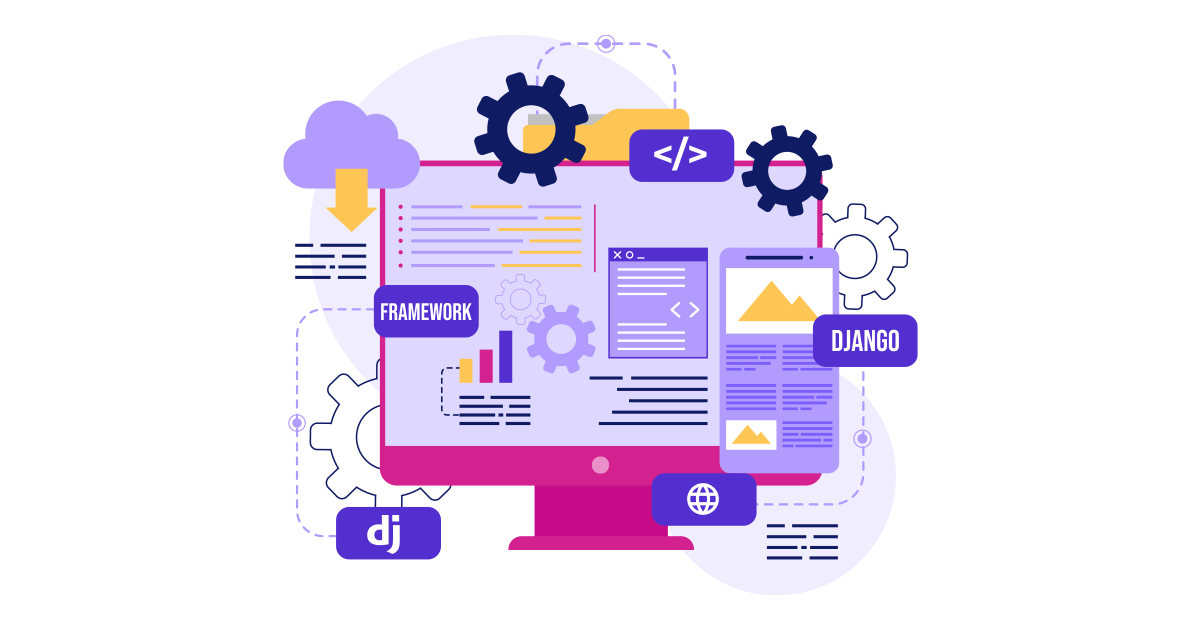
Django provides many built-in features, such as an admin interface, authentication system, and database management, reducing the need for developers to write repetitive code. This accelerates the development process and allows developers to focus on creating unique features for their mobile apps.
Leveraging Django for Mobile App Backend Development
Django is a powerful choice for backend development in mobile apps due to its scalability and versatility.
Django’s framework enables developers to build APIs (Application Programming Interfaces) effortlessly. These APIs act as intermediaries between the mobile app and the server, facilitating seamless data exchange. Django’s built-in support for handling authentication and authorization ensures secure access to app data.
Furthermore, Django’s ORM (Object-Relational Mapping) simplifies database management, making creating, reading, updating, and deleting data easier. This streamlines the development of backend functionalities and ensures the app performs efficiently.
Software Frameworks for Seamless Mobile App Development
Understanding Software Frameworks and their Importance
The importance of software frameworks lies in their ability to simplify complex tasks and reduce repetitive coding efforts. They provide reusable components, libraries, and modules that developers can leverage, saving time and effort. Additionally, frameworks ensure adherence to best practices and coding standards, leading to more organized and maintainable code.
How Software Frameworks Enhance Mobile App Development Efficiency
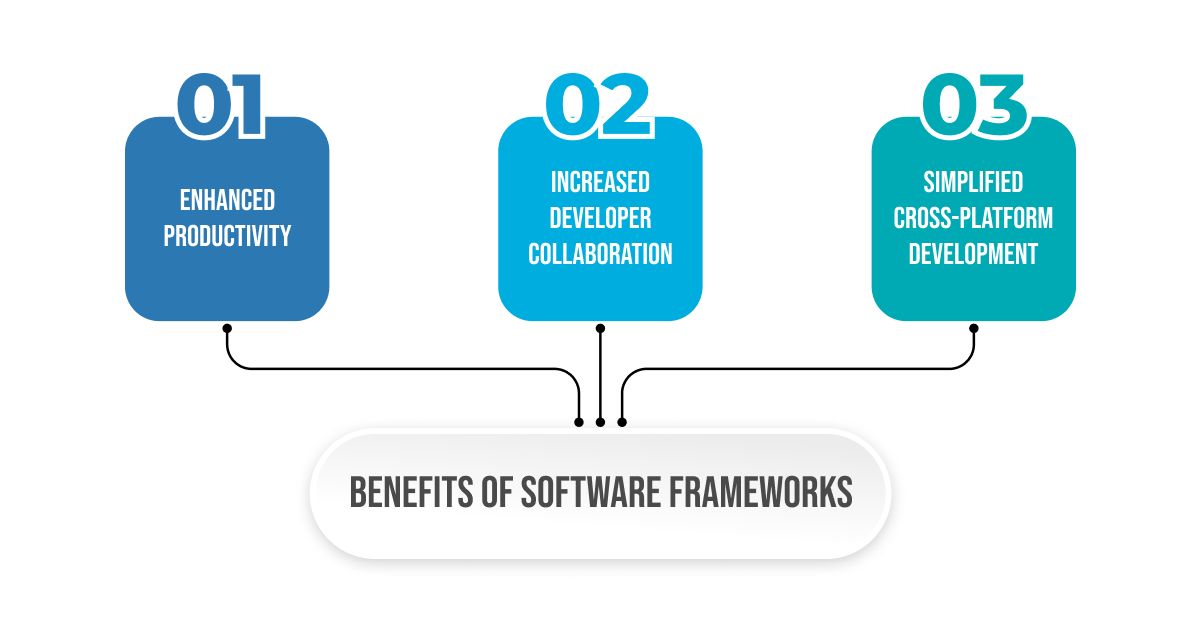
Regarding app development, software frameworks are vital in boosting efficiency and productivity. By providing a solid foundation and pre-built components, frameworks eliminate the need to start from scratch for each app. Developers can focus on creating unique features and functionalities rather than spending time on basic functionalities.
Moreover, frameworks enhance collaboration among developers. When everyone follows the same framework conventions, it becomes easier to understand and work on each other’s code. This leads to more efficient teamwork and quicker development cycles.
Frameworks also simplify cross-platform development. With the rise of hybrid and cross-platform mobile apps, frameworks that support multiple platforms have become invaluable. They allow developers to write code once and deploy it on various platforms, saving development time and resources.
Bottom Line:
The introduction of mobile apps has transformed how we live and engage with technology. Building feature-rich and user-friendly mobile apps has become more accessible and efficient as app development and software frameworks have evolved. Do you want to make your app idea a reality? Partner with Deftsoft, your dependable mobile app development company. We ensure high-quality and user-centric mobile apps adapted to your specific needs by leveraging our expertise in exploiting cutting-edge frameworks and software technologies.
Recent Articles
-

Unity vs Unreal Engine 5: Which is Better?
-

Non-Negotiable Tips for Developing a P2P Lending Platform
-

The 8 Leading Cross-Platform App Development Frameworks You Should Know
-

Step-by-Step Guide: How to Build a dApp on Ethereum with Ease
-

Why Does Your Business Need Blockchain Development Company’s Expertise?

Amardeep Singh Sandhu
 2nd August 2023
2nd August 2023